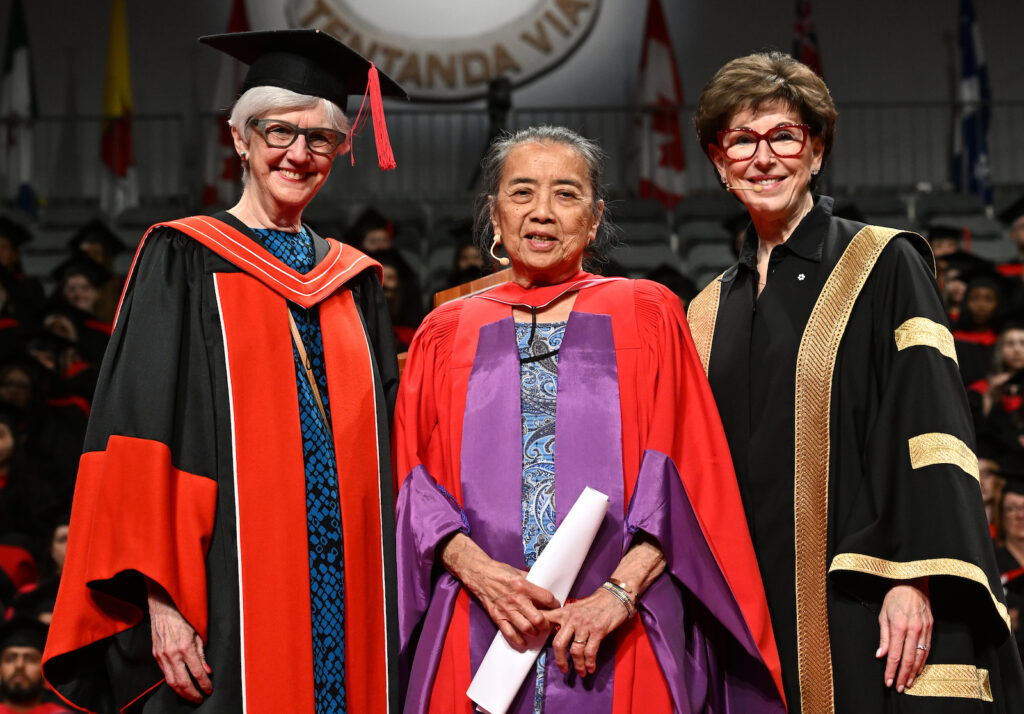
In a speech to graduands at the June 21 Spring Convocation ceremony, author, civil rights activist and recipient of York University's honorary doctorate of laws, Ruth Lor Malloy emphasized that greatness is not inherent in certain people, rather, it is born from acts of kindness anyone can perform.
Malloy was introduced by Faculty of Liberal Arts & Professional Studies Dean J.J. McMurtry, who showed his gratitude for her work by paraphrasing her own words. “’We may not be able to change the world, but we can brighten our own corners.’ Thank you so much, Ruth Lor Malloy, for brightening ours,” he said.
Malloy’s message to the new grads detailed how today’s political and social landscapes are in some ways both brighter and darker than when she first took up the mantle of civil rights activism.
Born into a family of Chinese restaurant owners in the small town of Brockville, Ont., Malloy had not even completed grade school by the time she had developed an acute awareness of racism and its ramifications. Her mother, a Canadian by birth, was unable to vote due to her Chinese heritage and the 1923 Chinese Exclusion Act, which also barred immigrants from China entering Canada until its repeal in 1947 – this was just one example of the systemic discrimination her family faced that compounded their ostracization from the community.
Still, Malloy knew that she needed to expand her understanding of racism and all of its manifestations. Later, during her time at university in Toronto, she "discovered that being shunned and subjected to derogatory namecalling was nothing compared to what some of [her] classmates had experienced.
“I met Jewish students who had barely escaped the Holocaust,” she said. “I dated a Canadian-born man who had been imprisoned as a child in western Canada because his parents were born in Japan.”
Searching for a calling, as many undergrad students do, Malloy leapt at opportunities to oppose the discrimination, both political and social, that had deeply troubled her throughout her adolescence. Among these efforts was her organization of a delegation in Ottawa that fought, and defeated, a regulation preventing Chinese Canadians from bringing grandparents to Canada – a right already afforded to other immigrant Canadians.
“After we fought for and achieved family reunification, I realized that ordinary people like me could successfully petition our government for such changes. It was exciting … and encouraging,” Malloy said.

Following graduation, she travelled through the U.S. and Mexico, planting fig trees to create economic opportunity for the Otomi Indigenous people and testing the service of segregated diners in Washington D.C. following the city’s enactment of anti-discrimination laws. That “was the year before Rosa Park’s historic stand in Alabama,” Malloy explained.
Developing a flourishing writing career throughout her work as an activist, eventually Malloy’s work took her overseas, where she’d learn about her cultural roots and the politics of 1970s China; about the social rift between Hong Kong and Japanese students, spurred by the Japanese occupation of Hong Kong that had recently ended; and about India’s Hijra people, a community typically composed of Hindus “who were born male but prefer to be female.”
“We encouraged one group of Hijras to tell us their story – their painful castration, their dreams and their relationship with their goddess. They wanted education, jobs and respect,” Malloy recounted. “As a result, Indian newspapers and magazines, reaching millions of readers, started publishing positive stories about them … I like to think we also influenced government practices. Official Indian documents, such as passport applications, now include a ‘transgender’ option.
“The problems you face today are existential and more critical than those of my era. Holding us back still is indifference and the lack of respect for others who are different from us,” she continued. “My generation made some progress, but we also saddled you with many issues to resolve. You have more skills and knowledge than my generation had, and I hope you will use them wisely.”
Highlighting the tangible influences of activism, journalism and individual creative expression – while acknowledging the novel anxieties in academia caused by artificial intelligence (AI) – Malloy beseeched the LA&PS grads to use their gifts to better the lives of others. “I hope you will not give your innate curiosity and your ability to think and create to artificial intelligence.
“My book Brightening My Corner: a Memoir of Dreams Fulfilled was recently published. Writing it without the help of a bot helped me evaluate what I did with my life in time to make a change and I hope you will also look at your lives too,” she concluded. “Have you really been respecting others and trying to alleviate their suffering? I believe that if we take down one stone from the walls of indifference and hatred that separate us, and someone else takes down another stone, someday, that wall will be gone. The torch is now yours.”
